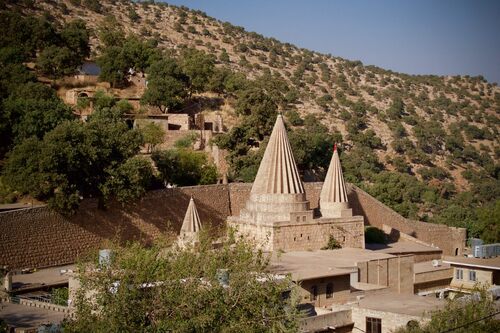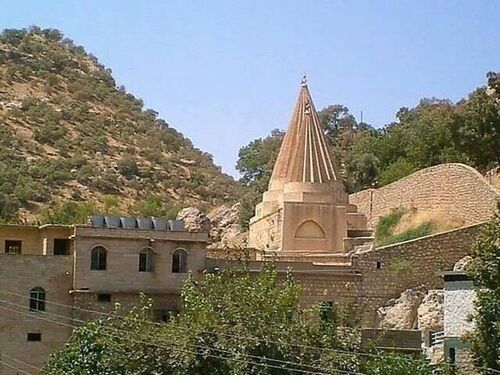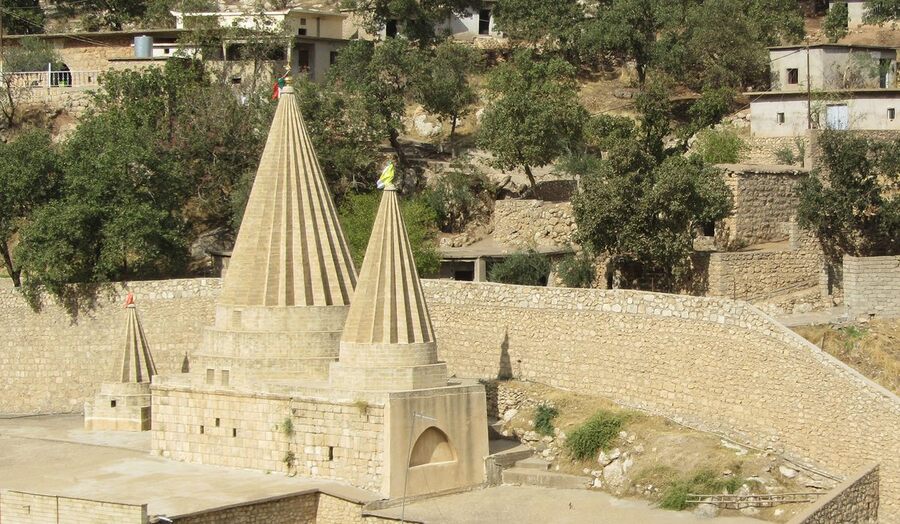Some sources related to the Yazidi religion date the religious and political oppression of the Yazidis to the Abbasid period. The Abbasid rulers put pressure on the Yazidis during their rule for more than five centuries, but sources say that on the contrary, the Umayyads supported them and considered themselves supporters of the caliph Yazid son of Mu'awiyah, Yazidis' sheikh did not let anyone speak against Yazid. Therefore, it seems that the Shiites, who were very opposed to Yazid, later gave them the name Yazidi.
The systematic oppression of the Yezidis began in the 15th century. After the Ottomans came to power in the seventeenth, eighteenth, and nineteenth centuries, they genocide them and killed tens of thousands of them in several major attacks. Both the names, “Yazidis” and “Satanists” have been given to them by Muslims for further repression.

The number of Yezidis in the eighteenth century was "two hundred and fifty thousand". Altogether they had "twelve thousand" cavalries. In the 19th century, after a massive massacre, their number decreased to "two hundred thousand" people and "eight thousand" cavalries, but after that, the massacre of the Yezidis continued and in the nineteenth century, the number of Yezidis dropped to "fifty thousand" people. Part of the massacre was carried out by Suleiman Pasha, the governor of Baghdad, who did not leave a single Yazidi beyond Mount Shengal (Sinjar).
After him, Ali Pasha, another governor of Baghdad, killed a large number of them. In 1837, Rashid Pasha and a group of Muslim Kurds attacked them and killed many of them.
The massacre of the Yezidis by the Ottomans in the 18th and 19th centuries was so widespread that European countries took a stand against it. In 1847, a British diplomat named Constantinople approached the Ottoman High Court to try to find a solution. Because of his efforts, the Ottoman court recognized the existence of a different religion called Yazidi, and because of the differences emphasized in the Yazidi religion, they were exempted from military service and it was decided that no Yazidis needed to join the military service for the Ottoman Empire. In 1849, a man named Sheikh Yusuf went to the Ottoman court as a representative of the Yezidis and reiterated their request and proposed that they be exempted from military service. The Ottoman Empire initially accepted their demand, but in 1872 the decision was cancelled and they were recruited.

This change was not accepted by the Yazidis and in the same year, many of the Yazidi elders, leaders, and nobles wrote a complaint to the Ottoman authorities explaining their reasons why they should not serve in the military. Some of the most important points of the complaint are listed below. However, all these points are detailed in the book Anastas Marie Karmli, translated by Dr. Najat Abdullah, and what caused the Yazidi ranks to separate themselves from other religions and believe that they should not serve in the military alongside others:
1. Every Yazidi must visit the image of Tawusi Melek (Tawus Angel) three times a year, otherwise he will become an infidel.
2. Every Yazidi must visit Sheikh Adi once a year, otherwise he will become an infidel.
3. Every Yazidi should go to a place where the sun rises in the morning and there should be no one belonging to other religions, otherwise he will become an infidel.
4. Every Yazidi must kiss the hand of his brother every day, otherwise he will become a disbeliever.
5. The Yezidis do not tolerate Muslims saying 'Auzubillahi' (أعوذ بالله ...) in the morning. If a Yazidi hears this, he must kill himself, otherwise, he will become a disbeliever.
6. When a Yazidi dies, a Yazidi, religious brother or sister, must recite one of the Yazidi promises to them, otherwise he will become a disbeliever.
7. Every Yazidi must have the dust of Sheikh Adi's feet in his pocket and eat it every morning, otherwise he will become a disbeliever.
8. Any Yazidi who is fasting must go to his sheikh's house in the morning and evening to break his fast with the wine of his sheikh.
9. Any Yazidi who leaves his land for more than a year will be divorced and his wife will not return to him and no one will give him a wife.
10. Every Yazidi has a religious brother and sister. If they buy new clothes, the religious brother and sister must open their collar for the first time, otherwise he will become an infidel.
11. Every Yazidi who is given new clothes must wash himself with the holy water of Sheikh Adi.
12. Blue shirts should not be worn among the Yezidis and should not use Muslims' and Christians' comb.
13. No Yazidi should go to the toilets and bathrooms of Muslims and eat and drink with their spoons and cups. If they do these, they are disbelieved.
14. The food of Yazidis and other religions is different. For example, we do not eat fish, pumpkin, okra, beans, lentils, and lettuce.
For these and many other reasons, we cannot serve in the military.
Some of the persons who signed the complaint include Hussein Mir Sheikh Ezidyan, Sheikh Nasir Sheikh Yazidi cleric, Pir Suleiman, the head of Rashan village and many other governors and leaders.








